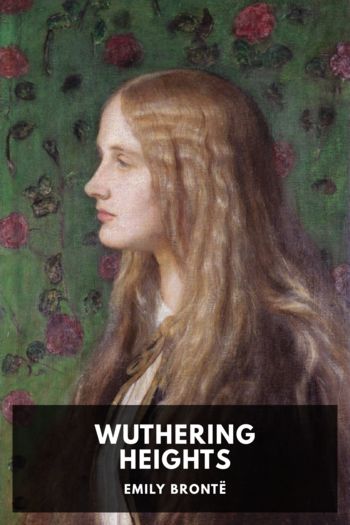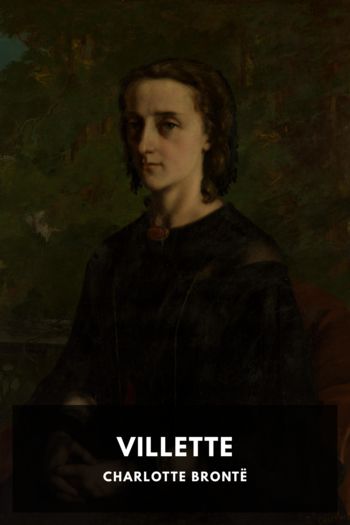Shirley by Charlotte Brontë (best books to read for teens .TXT) 📕

- Author: Charlotte Brontë
Book online «Shirley by Charlotte Brontë (best books to read for teens .TXT) 📕». Author Charlotte Brontë
Take Mr. Yorke’s family in the aggregate: there is as much mental power in those six young heads, as much originality, as much activity and vigour of brain, as—divided amongst half a dozen commonplace broods—would give to each rather more than an average amount of sense and capacity. Mr. Yorke knows this, and is proud of his race. Yorkshire has such families here and there amongst her hills and wolds—peculiar, racy, vigorous; of good blood and strong brain; turbulent somewhat in the pride of their strength, and intractable in the force of their native powers; wanting polish, wanting consideration, wanting docility, but sound, spirited, and true-bred as the eagle on the cliff or the steed in the steppe.
A low tap is heard at the parlour door; the boys have been making such a noise over their game, and little Jessy, besides, has been singing so sweet a Scotch song to her father—who delights in Scotch and Italian songs, and has taught his musical little daughter some of the best—that the ring at the outer door was not observed.
“Come in,” says Mrs. Yorke, in that conscientiously constrained and solemnized voice of hers, which ever modulates itself to a funereal dreariness of tone, though the subject it is exercised upon be but to give orders for the making of a pudding in the kitchen, to bid the boys hang up their caps in the hall, or to call the girls to their sewing—“come in!” And in came Robert Moore.
Moore’s habitual gravity, as well as his abstemiousness (for the case of spirit decanters is never ordered up when he pays an evening visit), has so far recommended him to Mrs. Yorke that she has not yet made him the subject of private animadversions with her husband; she has not yet found out that he is hampered by a secret intrigue which prevents him from marrying, or that he is a wolf in sheep’s clothing—discoveries which she made at an early date after marriage concerning most of her husband’s bachelor friends, and excluded them from her board accordingly; which part of her conduct, indeed, might be said to have its just and sensible as well as its harsh side.
“Well, is it you?” she says to Mr. Moore, as he comes up to her and gives his hand. “What are you roving about at this time of night for? You should be at home.”
“Can a single man be said to have a home, madam?” he asks.
“Pooh!” says Mrs. Yorke, who despises conventional smoothness quite as much as her husband does, and practises it as little, and whose plain speaking on all occasions is carried to a point calculated, sometimes, to awaken admiration, but oftener alarm—“pooh! you need not talk nonsense to me; a single man can have a home if he likes. Pray, does not your sister make a home for you?”
“Not she,” joined in Mr. Yorke. “Hortense is an honest lass. But when I was Robert’s age I had five or six sisters, all as decent and proper as she is; but you see, Hesther, for all that it did not hinder me from looking out for a wife.”
“And sorely he has repented marrying me,” added Mrs. Yorke, who liked occasionally to crack a dry jest against matrimony, even though it should be at her own expense. “He has repented it in sackcloth and ashes, Robert Moore, as you may well believe when you see his punishment” (here she pointed to her children). “Who would burden themselves with such a set of great, rough lads as those, if they could help it? It is not only bringing them into the world, though that is bad enough, but they are all to feed, to clothe, to rear, to settle in life. Young sir, when you feel tempted to marry, think of our four sons and two daughters, and look twice before you leap.”
“I am not tempted now, at any rate. I think these are not times for marrying or giving in marriage.”
A lugubrious sentiment of this sort was sure to obtain Mrs. Yorke’s approbation. She nodded and groaned acquiescence; but in a minute she said, “I make little account of the wisdom of a Solomon of your age; it will be upset by the first fancy that crosses you. Meantime, sit down, sir. You can talk, I suppose, as well sitting as standing?”
This was her way of inviting her guest to take a chair. He had no sooner obeyed her than little Jessy jumped from her father’s knee and ran into Mr. Moore’s arms, which were very promptly held out to receive her.
“You talk of marrying him,” said she to her mother, quite indignantly, as she was lifted lightly to his knee, “and he is married now, or as good. He promised that I should be his wife last summer, the first time he saw me in my new white frock and blue sash. Didn’t he, father?” (These children were not accustomed to say papa and mamma; their mother would allow no such “namby-pamby.”)
“Ay, my little lassie, he promised; I’ll bear witness. But make him say it over again now, Jessy. Such as he are only false loons.”
“He is not false. He is too bonny to be false,” said Jessy, looking up to her tall sweetheart with the fullest confidence in his faith.
“Bonny!” cried Mr. Yorke. “That’s the reason that he should be, and proof that he is, a scoundrel.”
“But he looks too sorrowful to be false,” here interposed a quiet voice from behind the father’s chair. “If he was always laughing, I should think he forgot promises soon, but Mr. Moore never laughs.”
“Your sentimental buck is the greatest cheat of all, Rose,” remarked Mr. Yorke.
“He’s not sentimental,” said Rose.
Mr. Moore turned to her with a little surprise, smiling at





Comments (0)